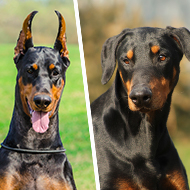Statistics suggest increase in dogs with cropped ears

61 per cent of vets believe they are seeing more dogs with cropped ears than ever before
The British Veterinary Association (BVA) has released shocking new statistics showing that more dogs with cropped ears are arriving in veterinary practices than ever before, suggesting a worrying trend of more dogs with illegally cropped ears in the UK.
The BVA Voice of the Veterinary Profession survey revealed that 58 per cent of small animal vets have seen more dogs with cropped ears in their practices in the last year, with 61 per cent of these vets believing that they are seeing more cropped dogs than ever before. The breed that was most commonly seen with cropped ears was the Doberman, followed by American bulldogs and cane corsos.
Whilst it is illegal to crop dogs' ears in the UK, there is a loophole in the law allowing the importation of dogs with cropped ears from other countries where it is legal, and it is not classified as a specific offence to send dogs abroad to have the procedure.
In the Queen's Speech last month, measures were announced to close these loopholes, and after a petition calling for action on this issue, which gained over 100,000 signatures, the UK Government pledged to ban the import of cropped dogs. Spearheaded by the BVA and The FOAL Group, under the banners of #CutTheCrop and #FlopNotCrop, the petition will remain open for signatures until August 2021.
The Government debated the petition yesterday (7 June), and confirmed its commitment to the issue, promising to introduce secondary legislation to prevent the import of dogs with cropped ears.
BVA President James Russell said, “We are deeply concerned that vets have been seeing more dogs with cropped ears in their practices. Ear cropping is illegal in the UK so we have to question how it’s possible that 6 in 10 vets have seen cropped dogs in the past year. These shocking figures clearly show that urgent action is needed to curb this disturbing rise.”
“We were delighted by the commitment made by Government last month to prohibit imports of dogs with cropped ears as well as rooting out illegal practice of this completely unnecessary and intensely painful mutilation in the UK. We are now urging them to bring these measures into play at the earliest possible opportunity.”



 The RCVS has announced a new version of its 1CPD mobile app, with enhanced features for veterinary surgeons and veterinary nurses to record their continuing professional development.
The RCVS has announced a new version of its 1CPD mobile app, with enhanced features for veterinary surgeons and veterinary nurses to record their continuing professional development.